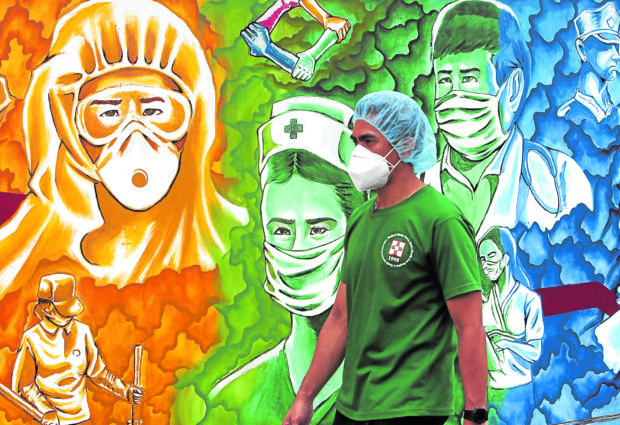Gov’t eases quarantine restrictions to help more businesses resume operations
MANILA, Philippines — The Inter-Agency Task Force on Emerging Infectious Diseases (IATF) on Saturday eased some quarantine restrictions to allow more businesses to resume full operations, according to presidential spokesperson Harry Roque.
Roque said in a statement on Saturday that the IATF issued Resolution No. 38, generally maintaining restrictions in areas under enhanced community quarantine (ECQ) and general community quarantine (GCQ) but easing some prohibitions in areas under modified enhanced community quarantine (MECQ).
Most of the country was placed under GCQ on May 1 except for Metro Manila, Laguna, Bataan, Bulacan, Nueva Ecija, Pampanga and Zambales, which were placed on MECQ. Cebu and Mandaue were asked to remain under ECQ because of their high number of coronavirus infections.
Most economic activities are allowed under GCQ, subject to public health precautions and local regulations intended to prevent more cases of the new coronavirus disease (COVID-19). ECQ and MECQ allow economic activities only to the most essential and limits the nonessential movement of people.
Full operation
But the new guidelines now allow the full operation of public or private hospitals; health and emergency front-line services; and manufacturers of medicines, medical supplies, devices and equipment in areas under all quarantine categories.
Resolution 38 also allows industries in agriculture, forestry and fishery as well as delivery and courier services for food, medicine and other essential goods to resume full operations in all quarantine categories.
For other industries, the previous ECQ rule on companies running at half capacity remains but those involved in the provision of essential goods and services, media entities, establishments offering utility relocation work and specified limited works are now allowed to resume full operations in MECQ areas.
The same will apply to medical, dental, rehabilitation and optometry clinics; pharmacies and drug stores; veterinary clinics; banks and money transfer services; capital markets, water supply, and sanitation services and facilities; energy and power firms; telecommunications companies; airline and aircraft maintenance in MECQ zones.

WALL OF FAME A Pasig City hospital worker walks past a mural honoring him and his fellow front-liners in the fight against the coronavirus. —MARIANNE BERMUDEZ
Gatherings
The IATF also allowed the full operation of manufacturing companies; state-run Philippine Postal Corp. and the Philippine Statistics Authority; business process outsourcing and export-oriented businesses; essential projects and funeral and embalming services.
The new guidelines also allowed gatherings for the provision of critical government services and authorized humanitarian activities, subject to prescribed health standards, in MECQ areas.
For areas under GCQ, the IATF also expanded the outdoor activities that people could undertake.
These include noncontact sports and other forms of exercise such as, but not limited to, walking, jogging, running, biking, golf, swimming, tennis, badminton, equestrian and skateboarding. Minimum health standards must be followed.
Operation of relevant clubhouses or similar establishments would be limited to basic operations.
The IATF issued the new rules as it prepared to meet on Monday and Wednesday to discuss the quarantines that were set to expire on May 31.
Roque said officials were still studying the matter but he described initial data as “encouraging.”
“I don’t want to say that that is a certainty because the data still has to be looked at. But it is encouraging because I read a [University of the Philippines] research showing that in many areas of the country, the doubling rate is now longer,” he said in an interview with dzBB radio.
“But we still have to look at the data of the [Department of Health],” he added.
Testing not required
As the government eased restrictions on business establishments, Interior Secretary Eduardo Año clarified that workers in the private sector should not be required by local authorities to get tested for coronavirus prior to being allowed to return to work.
He said the IATF, the Department of the Interior and Local Government, the Department of Trade and Industry and the Department of Labor and Employment, did not issue any directive imposing COVID-19 testing.
“To [local government units] that are issuing executive orders requiring companies or offices to subject their employees to tests, we have not issued anything that sanctions that,” he said.
Año, however, said companies may require their employees to undergo rapid antibody tests but they, not their workers, should shoulder the costs.
Tests would only be necessary, he said, if an individual had traveled to a coronavirus-hit country, had COVID-19 symptoms, or was exposed to a confirmed positive case.
Government agencies, local governments and even private companies can conduct “screening or diagnostic tests” in lieu of the mandatory COVID-19 testing, Año said.
He said, however, that “hasty testing” was not encouraged as that they were not practical due to the limited availability of test kits.
Labor Secretary Silvestre Bello III earlier said employers were not obliged to have their employees tested for COVID-19, more so, shoulder the expenses for the tests.
Only workers manifesting COVID-19 symptoms must be tested, Bello said.
—WITH A REPORT FROM MELVIN GASCON
For more news about the novel coronavirus click here.
What you need to know about Coronavirus.
For more information on COVID-19, call the DOH Hotline: (02) 86517800 local 1149/1150.
The Inquirer Foundation supports our healthcare frontliners and is still accepting cash donations to be deposited at Banco de Oro (BDO) current account #007960018860 or donate through PayMaya using this link.